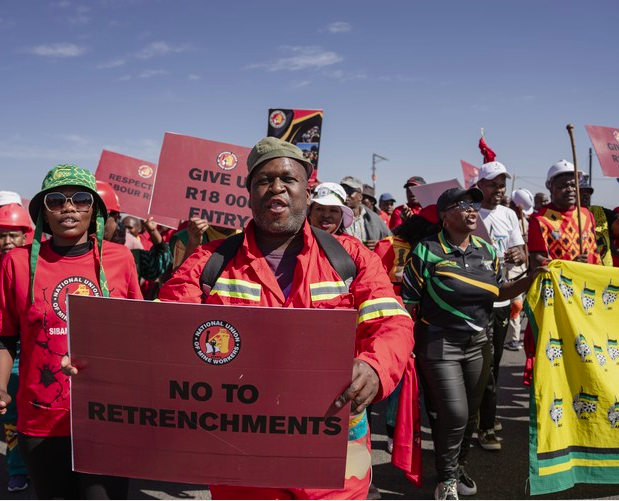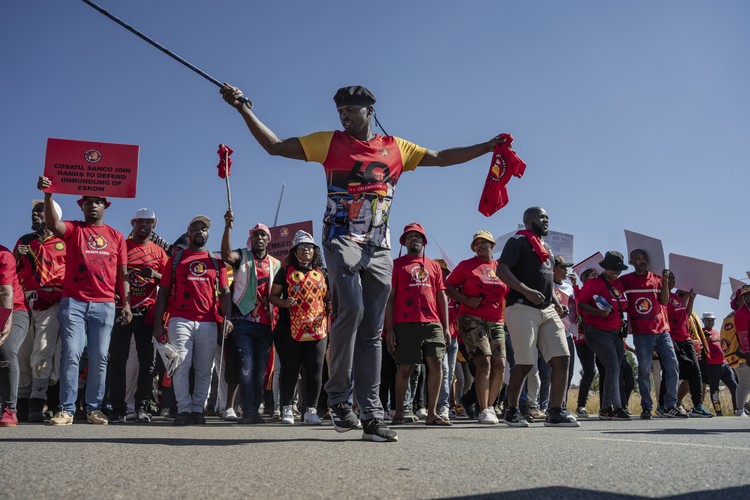Unions and workers march in the West Rand of Johannesburg against looming retrenchments at gold mining giant Sibanye-Stillwater. Photos: Ihsaan Haffejee
By Ihsaan Haffejee
- Hundreds of mine workers marched in the West Rand of Johannesburg on Saturday to protest looming retrenchments at gold mining giant Sibanye-Stillwater.
- The march was organised by the National Union of Mineworkers and supported by COSATU.
- Shortly after concluding a retrenchment process in December, Sibanye announced that more than 575 employees would be retrenched with a further 550 granted voluntary severance packages.
- NUM in its memorandum of demands calls for the resignation of top management and the CEO Neal Froneman, “as they are unable to stabilise and run the mining company”.
Hundreds of mine workers took to the streets on the West Rand of Johannesburg on Saturday to protest looming retrenchments at gold mining giant Sibanye-Stillwater.
The protesting mine workers highlighted the impact the company’s recent wave of retrenchments has had on workers and their families. Shortly after concluding a retrenchment process in December, Sibanye announced that more than 575 employees would be retrenched with a further 550 granted voluntary severance packages.
Then in April the company announced that a further 4,000 jobs could be at risk in its gold operations.
The company has claimed that a business review has identified a need to address losses at the Beatrix 1 shaft in the Free State and the Kloof 2 plant in the West Rand.
The protest on Saturday was organised by the National Union of Mineworkers and supported by COSATU. This comes after disgruntled NUM members disrupted COSATU’s May Day Rally in Soweto over what they claimed was a lack of support from the trade federation to the job losses at Sibanye.
Unions also questioned the timing of the announcement by Sibanye which occurred just before salary negotiations and at a time when the price of gold is surging.
“When there is a boom in the economy, they share the profits amongst themselves. And when they are not doing well and there is a knock on the economy the first people that must leave are the workers. South Africa cannot afford to have any more people who are unemployed,” said COSATU President Zingiswa Losi.
During a commodities boom in 2021 it was announced that Sibanye-Stillwater CEO Neal Froneman would receive a R300-million remuneration package which angered workers who pointed out the massive wage gap between management and workers.
“Thirty years down the line we have not really realised the mission to close those gaps. Workers don’t have decent houses, decent health care purely because they are underpaid,” said Mpho Phakedi, Deputy General Secretary National Union of Mineworkers.
Unions are questioning the timing of Sibanye’s retrenchment announcement as it falls just before its salary negotiations.
On Saturday, a large police presence watched over protesters who at one stage attempted to block the N12 highway, causing traffic to back up. Police negotiated with the miners who eventually marched on one side of the road. The rest of the march proceeded peacefully.
Mine worker Sibusiso Makeba said that the retrenchments were worrying because he is the sole breadwinner, and many people rely on him. “We are stressed. Every year with Sibanye it is the same story. Every year people lose their jobs,” said Makeba.
NUM in its memorandum of demands called for the resignation of top management and Froneman, “as they are unable to stabilise and run the mining company”.
Calls were also made for the Minister of Mineral Resources and Energy Gwede Mantashe to revoke Sibanye’s mining licence.
The looming retrenchments remain a pressing issue for workers in the run up to elections later this month, with some workers claiming they would not vote for the ANC if their grievances were not resolved.
The memorandum was handed over to representatives from Sibanye-Stillwater who indicated that they would give it to management. The union has given the company two weeks to respond, saying it will otherwise intensify industrial action.
A large police presence watched over protesters who at one stage attempted to block the N12 highway, causing traffic to back up.
Follow African Insider on Facebook, Twitter and Instagram
Picture: GroundUp
For more African news, visit Africaninsider.com




